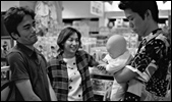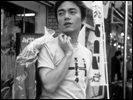Hush!
- Year
- 2001
- Original title
- Hashu!
- Japanese title
- ハッシュ!
- Director
- Cast
- Running time
- 136 minutes
- Published
- 20 May 2002



by Tom Mes
When we meet our three lead characters, they are all single and lonely. Naoya is a carefree guy who works in a pet shop catering to a rich and eccentric clientele. An avid visitor of Shinjuku's gay scene, he is open about his sexuality which seems to be accepted by everyone but his mother, who seems to be under the eternal impression that her son will inevitably grow breasts one day. Katsuhiro on the other hand hides his homosexuality from his colleagues at the research station where he works and does such a good job at it that one female colleague is hopelessly in love with him. Naoya and Katsuhiro meet one evening at Naoya's favourite bar and are soon on their way to an actual relationship.
The third element in the equation is Asako, a young woman who has lived a life resembling self-destruction. Now in her thirties, she wishes to turn over a new leaf and wants to have a baby. After a gynaecologist advises her to have a totally unnecessary hysterectomy, this wish only becomes stronger - as if having a child is the ultimate form of rebellion. When her umbrella is stolen in a restaurant, Katsuhiro offers her his, and from that moment Asako has found the ideal father for her child.
With the names and locations changed, the above premise might well sound like the pitch for Rupert Everett's next romantic comedy of errors. Indeed, based on the above outline it's not hard to imagine Hollywood chasing this one for the remake rights. However, it's doubtful whether that remake would ever achieve the level of subtlety, characterisation and careful observation that follow those opening twenty minutes and which mark Hashiguchi's film. Far from being a breezy, formulaic romantic comedy, Hush! is a truthful document of the lives of three human beings and the constant pressure they feel to succeed in life and face up to their environment.
No longer focusing on teenagers, the director's third film does however allow itself to be more light and humorous to reflect the lives and experiences of its three lead characters. In their early thirties and therefore older and wiser than the confused high school kids of A Touch of Fever (Hatachi no Binetsu, 1993) and Like Grains of Sand (Nagisa no Shindobaddo, 1995), Asako, Naoya, and Katsuhiro are people who can put things into perspective and the film follows naturally. Hush! at times certainly seems like a comedy, especially in the crowdpleasing scenes involving barfly Yuji, a loud and abrasive, but ultimately loveable fellow patron at Naoya's favourite hangout. But it's not the laughs that make such scenes work, it's how much they feel like episodes from the character's lives. This goes equally for the film's more dramatic scenes, which never exist to wallow in misery but offer subtlety even when characters are screaming at each other.
Despite the seemingly breezy premise, Hashiguchi covers a lot of thematic ground in his script. Aside from his trademark concerns with the position of homosexuals in contemporary Japan, there seems to be a current running through the film about re-addressing the definition of the term 'family'. All three characters are shown in scenes with their direct relatives: Naoya with his ignorant mother, Asako with her estranged taxi driver father, and Katsuhiro with the family of his brother. Compared to the loveless atmosphere in the arranged marriage of Katsuhiro's brother and the last remnants of family that are Naoya's and Asako's respective mother and father, the ménage-à-trois the three leads decide to undertake comes across as a more than healthy alternative. In fact, given the strong contrast, it almost seems as if Hashiguchi is pleading for a changing of the guard, as if this film is his statement on the bankruptcy of the traditional family unit. This may form somewhat too radical a reading, but there is a definite sense here of providing alternative options.
Hush! is a pleasing, winning, funny, and often poignant comedy/drama, centered around a threesome of magnificent performances from Takahashi (Kamikaze Taxi), Tanabe (Charisma, Blues Harp) and the highly versatile Kataoka (one of the best actresses working Japan at the moment, seen in films as diverse as A Touch of Fever, Rokuro Mochizuki's Onibi: The Fire Within, and A Drowning Man). It once again bears witness to Hashiguchi's extraordinary talent of portraying utterly believable human characters. After A Touch of Fever and Like Grains of Sand, Hush! delivers the final proof that he is indeed a filmmaker of great talent and ability, who deserves much more than the misguided label 'gay filmmaker' allows.